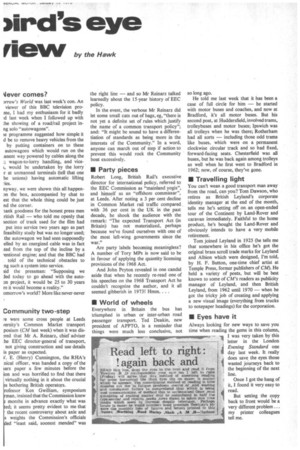,ird's eye
Page 37

If you've noticed an error in this article please click here to report it so we can fix it.
newby the Hawk
'lever comes?
?rrow's World was last week's con. An viewer of this BBC television prome, I had my enthusiasm for it badly A last week when I followed up with the showing of a road/rail project inng solo "autowagons".
le programme suggested how simple it d be to remove heavy vehicles from the by putting containers on to these autowagons which would run on the 'anent way powered by cables along the :; wagon-to-lorry handling, and vicewould be undertaken by the lorry at unmanned terminals (tell that one he unions) having automatic lifting nyway, we were shown this all happenDn the box, accompanied by chat to est that the whole thing could be just nd the corner.
lank goodness for the honest press men ritish Rail — who told me openly that section of track used for the film had put into service two years ago as part feasibility study but was no longer used; the autowagon we had seen supposedly elled by an energized cable was in fact ited from the top of the incline by a entional engine; and that the BBC had told of the technical obstacles to ng such a system into service.
lid the pressman: "Supposing we Jed today to go ahead with the autoDn project, it would be 25 to 30 years re it would become a reality."
omorrow's world? More like never-never the right line — and so Mr Reinarz talked learnedly about the 15-year history of EEC policy.
In the event, the verbose Mr Reinarz did let some small cats out of bags, eg, "there is not yet a definite set of rules which justify the name of a common transport policy"; and: "It might be sound to have a differentiation of standards as being more in the interests of the Community." In a word, anyone can march out of step if action to prevent this would rock the Community boat excessively.
• Party pieces
Robert Long, British Rail's executive director for international policy, referred to the EEC Commission as "mainland yogis", and himself as an "offshore commissar", at Leeds. After noting a 3 per cent decline in Common Market rail traffic compared with 36 per cent in the UK in the past decade, he shook the audience with the remark: "The expected Transport Act (in Britain) has not materialized, perhaps because we've found ourselves with one of the most left-wing governments since the war."
Are party labels becoming meaningless? A number of Tory MPs is now said to be in favour of applying the quantity licensing provisions of the 1968 Act.
And John Peyton revealed in one candid aside that when he recently re-read one of his. speeches on the 1968 Transport Act he couldn't recognize the author, and it all seemed gibberish in 19731 Hmm. .
III World of wheels
Everywhere in Britain the bus has triumphed in urban or inter-urban road passenger transport. Ted Deakin, new president of APPTO, is a reminder that things were much less conclusive, not so long ago.
He told me last week that it has been a case of full circle for him — he started with motor buses and coaches, and now at Bradford, it's all motor buses. But his second post, at Huddersfield, involved trams, trolleybuses and motor buses; Ipswich was all trolleys when he was there; Rotherham had all sorts — including those odd trams like buses, which were on a permanent clockwise circular track and so had fixed, forward-facing seats. Chesterfield was all buses, but he was back again among trolleys as well when he first went to Bradford in 1962; now, of course, they've gone.
• Travelling light
You can't wean a good transport man away from the road, can you? Tom Dawson, who retires as British Leyland's corporate identity manager at the end of the month, tells me he's setting off on an open-ended tour of the Continent by Land-Rover and caravan immediately. Faithful to the home product, he's bought the Land-Rover and obviously intends to have a very mobile retirement.
Tom joined Leyland in 1925 (he tells me that somewhere in his office he's got the original brass scroll trade marks for Leyland and Albion which were designed, I'm told, by H. F. Button, one-time chief artist at Temple Press, former publishers of CM). He held a variety of posts, but will be best known to some of CM's readers as publicity manager of Leyland, and then British Leyland, from 1962 until 1970 — when he got the tricky job of creating and applying a new visual image (everything from trucks to notepaper headings) for the corporation.
• Eyes have it
Always looking for new ways to save you time when reading the gems in this column, I was very taken by this letter in the London Evening Standard one day last week. It really does save the eyes those wasted journeys back to the beginning of the next line.
Once I got the hang of it,. I found it very easy to read.
But setting the copy back to front would be a very different problem ... my printer colleagues tell me.




















































































































